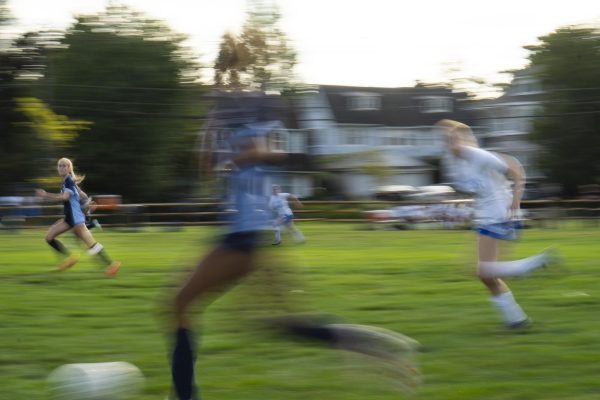
Wyatt Campuzano ‘27
Soccer players speed by. The next girls' home soccer game is October 6th at 3:45, and the next boys' home soccer game is October 7th at 4:00.
Imagine: You’re running off post-match adrenaline. You just got the game-winning shot or set a new personal record. You’re on the bus ride home back laughing with your friends— but then it hits you. You have two textbook readings, a French test, and four other assignments due tomorrow.
You don’t know whether to soak up the achievement you spent so long waiting for, or to just start crying over the amount of work you have. Does this sound familiar to you?
Almost every student at Abington Friends School plays or had played a sport once in their high school experience. Our school revolves around athletics: sports are amplified through the halls, through posters and announcements, or our requirements for sports credits, Roo-Pacs.
While sports bring many students and the school an immense pride and joy, student athletes often face unique mental health challenges that are overlooked around campus.
Emma Hacker ‘27 said “Sports allow… me to be… myself and make friends.” But she also feels like she struggles with “balancing…schoolwork and sports.” She describes often feeling “stressed” due to the expectations placed on her by her sport and the community around her.
Gio D’Amico ‘27 also said he feels like “students should get more extensions and teachers should be understanding in regard to student athletes’ schedules”.
D’Amico and Hacker both also said how they are frustrated when compared to their peers. They argue non-student athletes get the luxury of getting home on time and being able to complete homework early and they don’t. However, they still both have the same expectations placed on them by teachers.
It is true that many student-athletes stay up late after away games doing schoolwork. The lack of sleep and downtime leads to cycles of anxiety and exhaustion; ones that are often battled alone.

Although it may seem like a student athlete is thriving, a lot of the time, they’re battling a multitude of struggles. Many student athletes face pressures coming from all directions, such as coaches, parents, and peers. A lot of them feel great pressure and expectations to win, to represent the school, to make someone proud.
All these expectations coming from school and sports can lead to burnout. Some athletes even describe feeling a loss of love for their sport. When student athletes look visibly healthy, it’s hard to see what’s really going on beneath the surface.
According to a study on college athletes, 33% of all college students will experience serious mental health struggles such as depression or anxiety, and 30% of them will seek help. However, when it comes to college student-athletes only about 10% seek help for their mental health.
Teachers and coaches are often uneducated about these struggles and miss crucial signs such as missing assignments and unusual fatigue.
Furthermore there are often inadequate resources to help guide student athletes. The discussion around mental health is often stigmatized, and so student athletes feel as though they are struggling alone.
This couldn’t be farther from the truth as The National Collegiate Athletic Association found that 30% of surveyed athletes feel extremely overwhelmed and 25% of those athletes feel mentally exhausted.
The battle against mental health needs to be addressed through unity and awareness. Behind the smiles and the highlight reels, athletes are humans first. It is up to our school community to start the conversation surrounding mental health.
If you are interested in becoming an advocate or looking for more resources, please reach out to Emma Hacker or to me. Under the advice of Head Athletic Trainer Alexis Bonisese and Cross-Country and Track and Field coach Jess Neushwander, we are founding our school’s first chapter of the non-profit “Morgan’s Message,” an initiative created after the tragic death of beloved Duke lacrosse player Morgan Rodgers. The club will aim to join the international fight against the stigma surrounding student athletes’ mental health and help create a better AFS community.
Know that you are seen, heard, loved, and more than an athlete.